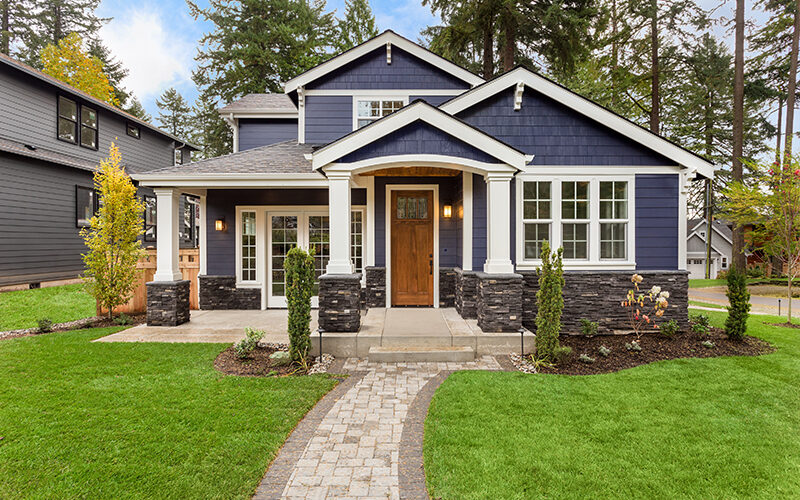A primary residence or principal residence is a home where someone lives, typically a house or an apartment. A person can have only one primary residence at any given time, though they may share the residence with other people. It is also a legal dwelling for the purpose of acquiring capital gains tax and/or mortgage on your primary residence. Read on to find out how to exchange your primary residence with the 1031 exchange; and how to avoid capital gains taxes on the sale of a primary residence.
Capital Gains Tax on Primary Residence
When your primary residence increases in value and you decide to sell it. You may be able to deduct some of the capital gains from the sale proceeds. Currently, the IRS allows taxpayers to exclude up to $500,000 in capital gains; if married and filing jointly or $250,000 if single. For example, if you bought a home 10 years ago for $200,000 and you sell it today for $800,000. You will have a profit of $600,000. If you’re married and filing jointly, $500,000 of the gain may be exempt from capital gains tax but $100,000 may remain.
In either case, let’s say you invest $200,000 on a house. It is your primary residence and the only one you own. After a few years, you decide to relocate and sell it for a higher price. After deducting the costs of the sale, your profit is $50,000. If you match the exclusion rules, you won’t have to pay capital gains taxes on that profit. Depending on your income, the capital gains tax rate on your primary residence is 0%, 15%, or 20%.
Also, your primary residence may also qualify for income tax benefits, such as a deduction for mortgage interest costs as well as exclusion from capital gains tax when you sell it. However, because of the tax advantages, the IRS has established some explicit guidelines. This is to determine whether your house qualifies for the capital gains tax deduction as a primary residence.
To Qualify for the Primary Residence Exclusion,
- You must have lived in your home for at least 24 months of the previous five years.
- It must be your primary residence for at least 24 months of the preceding five years.
- You must not claim another capital gains exclusion in the previous two years.
The tax savings for mortgage interest isn’t the only advantage of owning a primary residence. When you sell your property, you may also be able to deduct capital gains.
How Many Months Is Considered Primary Residence?
Simply, a primary residence is the property where you reside for more than six months every year. Your dwelling could be a single-family home, townhouse, condominium, mobile home, or even a boat.
How Does IRS Know Your Primary Residence?
The address you put on your federal and state tax returns. Where your driver’s license or car registration says you live and the address that the U.S. Postal Service has on file.
1031 Exchange Primary Residence
A 1031 exchange, also known as a like-kind exchange or a Starker, is a transaction in which there is an exchange between one investment property and another. Most exchanges are taxable as sales, but if yours matches the 1031 standards. You’ll either have no tax or only a small amount of tax payable at the time of the exchange.
In essence, you can modify the type of your investment without cashing out or recording a capital gain, as the IRS sees it. As a result, your investment can continue to grow tax-free. There is no limit to how frequently you can perform a 1031 exchange. However, you can roll gains from one piece of real estate investment over to another. Even if you make a profit on each swap, you don’t have to pay taxes on it until the end of the year or years later.
There is an exemption to the capital gains exclusion, and it pertains to the property of the primary residence purchased earlier through a 1031 exchange. If you own a primary residence property and wish to sell it to buy another, you can postpone paying capital gains tax on the sale if you perform a 1031 exchange.
Furthermore, during a 1031 exchange of your primary residence, you can sell one investment property and buy another like-kind investment property within a particular time limit. But if you finally move into another investment home and turn it into your primary residence. If you sell the property you got through the 1031 exchange within 5 years of obtaining it, you will not be entitled to the capital gains exclusion.
When To Use A 1031 Exchange
There are multiple reasons why you might want to use a 1031 exchange. You may want to:
- Invest in a property with a high rate of return than your present investment property.
- Merge several properties into one, possibly for the purpose of estate planning.
- Reverse the decline of the property.
- Make your vacation house a rental property and perform a 1031 exchange. For instance, you may cease using your beach house, rent it out for a few months, and then trade it in for another.
- Sell your investment property and buy multiple properties. You can, for example, buy three investment houses if you wish to. There is no limitation to it anyway. If you purchase more than three, your competent intermediary will need to go over some additional rules with you.
1031 Exchange Rules And Regulations
Below are rules and regulations that pertain to a 1031 exchange, including property requirements and time requirements. Property Requirements Includes:
1. The Replacement Property Must Be Equal to or Better Worth Than the Lost Item.
Both traits must be sufficiently similar to be considered “like-kind.” Most real estate properties are similar to other real estate. For example, real estate improved properties with a residential rental house can be comparable to vacant land. Also, note that properties within the United States are not equivalent to properties outside the United States.
2. The Type and Function of the Exchanged Properties Must Be Similar.
A rental or multifamily property, for example, cannot be traded in for a vacation house. Personal use residences, such as a primary residence, second home, or vacation home, are not eligible for like-kind exchanges. Both actual property and personal property (which can include machinery, equipment, collectibles, vehicles, boats, aircraft, artwork, patents, and other intellectual property) can qualify as exchange properties of your primary residence under Section 1031, although the actual property can never be like-kind to personal property. Personal property is also subject to stricter regulations. Cars, for example, do not have the same features as trucks.
3. You Are Not Cannot Keep the Profits of a Sale During the Exchange at Any Time.
A competent broker must hold all your funds in escrow or the profits will be taxable. Finally, 1031exchange does not include these exchanges:
- Investing in stocks, bonds, or notes
- Partnership interests
- Other securities or debt
- Certificates of trust
Time Requirements
With a 1031 tax exchange, you must also stick to specific timelines or the gain on the sale of your property may become taxable:
- After the sale of your surrendered property, you have 45 days to find potential replacement properties. You must do so in writing and forward it to the seller or the competent intermediary.
- You must close on the replacement property within 180 days of closing on the surrendered property, or after the due date of your tax return, whichever comes first.
Tax Implications of a 1031 Exchange
As a result of performing a 1031 exchange, you may face some tax issues. Consider these examples:
- During a 1031 exchange, capital gains may accrue for any leftover cash, referred to as the “boot.”
- You may be taxed on the difference if the mortgage on the replacement property is lower than the mortgage on the surrendered property.
- If the sale fails, you will be taxed for the sale of your surrendered property
- If you do a lot of 1031 exchanges over the years, you could end up with hundreds or thousands of dollars in deferred profits, which can increase your tax liability.
Taxes on Sale of Primary Residence
Are there taxes on the sale of your primary residence? If you make a profit on the sale of your primary residence, you must pay taxes on all federal units. The tax is around 0.2 to 0.3 percent of the property’s estimated value. The taxpayers are the land register owners or co-owners. If you bought your property many years ago when prices were significantly lower, you could make high profits.
In most federal units, the amount of profit you have to pay in tax depends on how long you have been with the house. The longer you do have the property, the smaller the property gains tax is. On the other hand, the federal units tax real estate gains realized over a short period of ownership more heavily, reducing the motivation to participate in property investment.
Can You Have 2 Main Residence?
A person may have only one primary residence for tax purposes at any given time, and a married couple or civil partners may have only one principal residence between them.
What Is the Difference Between a Primary Residence and Second Home?
A second home is exactly that: a second place to live. Even though it’s not your main residence, you’ll live there part of the year, maybe on the weekends, during the holidays, or during certain times of the year. Most of the time, at least 50 to 100 miles must separate this property from your main home for it to be considered a second home.
When Do You Pay Capital Gains Taxes on the Sale of Your Primary Residence?
There will be tax payable on the whole gain of your primary resident sale if any of these factors are true:
- If you don’t live in the house as your primary residence.
- You owned the property for fewer than two years out of the five years before selling it.
- You did not live in the house for at least two years before selling it in the five-year period before the sale. However, those who are disabled, as well as those in the military, foreign service, or intelligence community, can get a discount on this component.
- You used the $250,000 or $500,000 exclusion on another home in the two years preceding the sale of this one.
- You purchased the residence during the last five years through a like-kind exchange; basically swapping one investment property for another
- You must pay expatriate tax.
If you’re still not certain about qualifying for the exclusion; you can scroll down for strategies to avoid capital gains taxes on the sale of your primary residence :
How to Avoid Capital Gains Tax on a Primary Resident Sale
1. You Must Be a Primary Resident for at Least Two Years.
The two years do not have to be consecutive, but house flippers should be cautious. If you sell a home that you haven’t lived in for at least two years, the gains may be taxable. Selling in less than a year is extremely costly since you may be subject to the short-term capital gains tax, which is higher than the long-term capital gains tax.
2. Check to See if You Are Eligible for an Exception.
If you have a taxable gain on the sale of your home, you may be able to exempt some of it if you sold the house due to a job, health, or “an unexpected incident,”
3. Keep the Receipts for Your Home Improvements.
The capital gains tax of your house often comprises the purchase price as well as any renovations you make over time. When your cost basis is larger, your capital gains tax exposure may be smaller. Remodeling, additions, new windows, landscaping, fences, new driveways, and air conditioning installations are all examples of things that may reduce your capital gains tax.
Conclusion
Before you buy a house, it’s important to consider what kind of house you want to buy. Are you looking to buy a primary home, a second home/vacation home, or an investment property? These are critical issues that will influence the sort of mortgage rate you may qualify for, as well as the tax treatment of your mortgage interest payments and any gain you realize when you decide to sell.
Primary Residence FAQs
How long do you have to live in your primary residence to avoid capital gains in UK?
You’re only liable to pay capital gain tax on any property that isn’t your primary place of residence – i.e. your main home where you have lived for at least 2 years.
Can I sell my main residence and move into my second home?
Yes, you can sell your primary residence and move into your second home but the tax you will receive is called Private Residence Relief. You don’t pay Capital Gains Tax when you sell your main residence and move home.
Can I avoid capital gains by buying another house?
You can avoid a significant portion of capital gains taxes through the home sale exclusion, a large tax break that the IRS offers to people who sell their homes. People who own investment property can defer their capital gains by rolling the sale of one property into another.
How long do you have to live in a property for it to be your main residence?
A recent decision by the First-tier tax tribunal confirmed that there is no minimum period of residence that is needed to secure main residence relief – what matters is that there has been a period of residence as the only or main home.
{
“@context”: “https://schema.org”,
“@type”: “FAQPage”,
“mainEntity”: [
{
“@type”: “Question”,
“name”: “How long do you have to live in your primary residence to avoid capital gains in UK?”,
“acceptedAnswer”: {
“@type”: “Answer”,
“text”: “
You’re only liable to pay capital gain tax on any property that isn’t your primary place of residence – i.e. your main home where you have lived for at least 2 years.
“
}
}
, {
“@type”: “Question”,
“name”: “Can I sell my main residence and move into my second home?”,
“acceptedAnswer”: {
“@type”: “Answer”,
“text”: “
Yes, you can sell your primary residence and move into your second home but the tax you will receive is called Private Residence Relief. You don’t pay Capital Gains Tax when you sell your main residence and move home.
“
}
}
, {
“@type”: “Question”,
“name”: “Can I avoid capital gains by buying another house?”,
“acceptedAnswer”: {
“@type”: “Answer”,
“text”: “
You can avoid a significant portion of capital gains taxes through the home sale exclusion, a large tax break that the IRS offers to people who sell their homes. People who own investment property can defer their capital gains by rolling the sale of one property into another.
“
}
}
, {
“@type”: “Question”,
“name”: “How long do you have to live in a property for it to be your main residence?”,
“acceptedAnswer”: {
“@type”: “Answer”,
“text”: “
A recent decision by the First-tier tax tribunal confirmed that there is no minimum period of residence that is needed to secure main residence relief – what matters is that there has been a period of residence as the only or main home.
“
}
}
]
}
Related Articles
- Tax Deductions For Homeowners: Top 7 Tax Deductions For Homeowners 2022
- QPRT: Complete Qualified Personal Residence Trust Guide(+Quick Tools)
- 1031 EXCHANGE FLORIDA: Tax Exchange Rules, Timeline, and Processes 2022
- Dollar Gains In Strength Due To Pandemics
- 6 Things You Must Know When You Buy Solana in Australia
- What is a Co-op: How to Get a Co-op Housing in 2022






